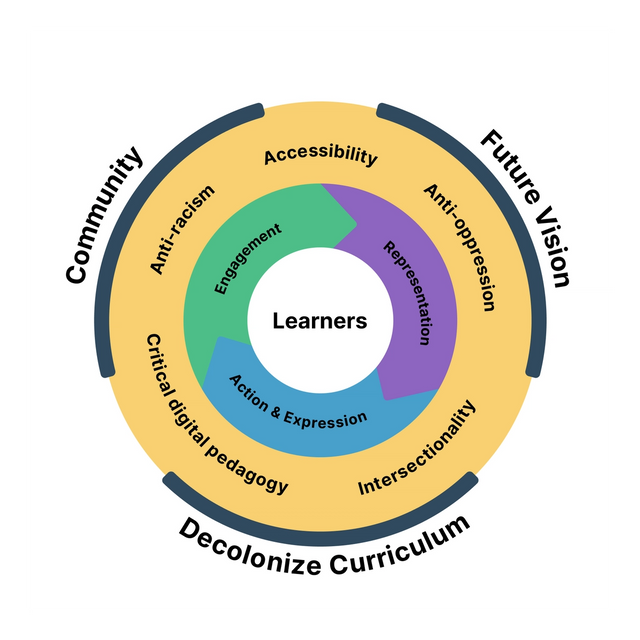What is Universal Design for Learning (UDL)?
UDL is a framework that is intended to be used to improve teaching and make learning more accessible to students. It is a combination of a variety of aspects to ones teaching methodologies, and

centres around three key principles. This is the ways in which you engage students, represent the information you teach, and opportunities you give students to demonstrate their learning. Doing
so breaks down barriers for learners to better understand material and take more away from a class. All of us are unique and have diverse ways of learning things effectively in new ways, so by utilizing this framework, people can make the decision for themselves on how to best help themselves succeed without judgement. This website is a great resource for learning more in depth of what UDL is, and how it helps create inclusive environments: https://udlguidelines.cast.org/ I really like this image as it conveys the impact these three key principles of UDP have on building community, decolonizing the cirriculum and improving the future.
My Personal Exerience with UDL
In both physical and digital classrooms, there are a variety of techniques one can employ within the UDL framework. One experience I have is having the option to take on an additional project to reduce exam weighting, or dropping the worst grade on a certain assessment. These options gave me the flexibility to choose which evaluation I felt best suited how I could convey my understanding in an assesment setting, as well as reducing the stresses I had on a single point of failure for an assessment, given I did not have to worry about my worst grade.
Accessibility in Online Settings
Accessibility is often overlooked in online settings, not just in learning environments, but across all websites. Content viewed digitally should be accessible for all people, regardless of their own abilities or learning styles such that they can engage with the media. This includes ensuring images that have meaning include descriptive alternative text and transcripts are provided for video and audio materials for example. Below shows how an ALT-tag is used to describe an image that some learners may not be able to see.
Inclusive Design
Keeping the above in mind allows for students with screen reading software to have equitable access to the digital resources provided. Color contrast and visual design is also important for students with visual impairments, or that may have difficulty with navigation on digital platforms. The Learning Coach has a great episode on Inclusive Design by Connie Malamed:
I want to highlight the podcast bringing up the usage of flexible learning environments, as this algins with our UDL framework. Various formats aligns with the multiple means of representation principal, and is important to support equitable access to learning outcomes.
Ethical Challenges of EdTech
One key thing to consider is the ethical issues that can arise with the use of edtech in a learning environent. Here in Canada, we have FIPPA which helps guide a bit on the data privacy and security concerns. Educators can utilize a variety of tools and technologies to enhance students’ learning, but must ensure they do not violate any acts in place that are meant to rpotect the students.
Equity is another area that comes up as access to digital resources can be hindered by unreliable internet access, lack of personal devices, or even lack of digital literacy skills. Teachers have the opportunity to give resources on building personal literacy skills in a digital setting, such as this website:
Unfortunately some issues are tougher to combat, like lack of access to personal devices or strong, reliable internet. Implementing UDL principals can help combat this by not requiring students to attend synchronous sessions in which they have no way to catch up on missed content, and could access digital pieces through public libraries or devices lent out at school on their own schedule.
Experience with Ethical Considerations in Digital Interactions
I help out on an online community for students, so there is a responsibility I have to uphold respect, inclusivity, and privacy of others on there. In general, these should be applied by everyone, and calling people out who do not align with this is important to make the environment accessible and inclusive to all to take advantage of.
Privacy
This is something seen across the internet, as people can sit behind screens and have their own new online identity to go by. This can allow for people to be more expressive of themselves in positive ways, and its crucial to respect everyones privacy and ensure they don’t have to worry about losing that.
Inclusivity
I think with the rise of social media and nieche groups people can interact with, people are growing to be more comfortable with themselves and be more expressive. There is a very loud minority, however, that attacks peoples right to access digital resources or communities online through discrimination and harrassment. This is where I, like others, take the stance that inclusivity isn’t meant for everyone, and those people should be removed from accessing these environments, such that it is more inclusive for all.
Ethics
This can span a variety of things. In my experience, its important to uphold academic integrity in our online, student focused community. Since we’re facilitating this space, it is our duty to ensure we prevent other students from easily accessing others who can commit plagiarism, help facilitate cheating, and more.
This video is a clip from a great video on Privacy in a Digital Era, but focues on bringing up a good topic on the learning of ethics one gets out of a degree:
As someone graduating at the end of this semester, I do think its extremely crucial and valuable to take a wide breadth of classes to enhance your understanding and ability to think critically, and make important decisions while understanding the implications.


